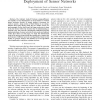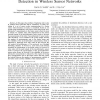2129 search results - page 6 / 426 » Reliability of Wireless Sensor Network with Sleeping Nodes |
128
click to vote
IJSNET
2006
15 years 1 months ago
2006
: To extend the functional lifetime of battery-operated Wireless Sensor Networks (WSNs), stringent sleep scheduling strategies with communication duty cycles running at sub-1% rang...
100
Voted
INFOCOM
2006
IEEE
15 years 7 months ago
2006
IEEE
— The inherent trade-off between energy-efficiency and rapidity of event dissemination is characteristic for wireless sensor networks. Scarcity of energy renders it necessary fo...
142
Voted
DCOSS
2005
Springer
15 years 7 months ago
2005
Springer
In surveillance and tracking applications, wireless sensor nodes collectively monitor the existence of intruding targets. In this paper, we derive closed form results for predicti...
123
click to vote
GLOBECOM
2008
IEEE
15 years 8 months ago
2008
IEEE
—In this paper, the problem of deploying relay nodes in wireless sensor networks will be considered. A system consisting of a set of sensor nodes communicating to a fusion center...
133
click to vote
ISCC
2005
IEEE
2005
IEEE
Preserving Area Coverage in Wireless Sensor Networks by Using Surface Coverage Relay Dominating Sets
15 years 7 months ago
— Sensor networks consist of autonomous nodes with limited battery and of base stations with theoritical infinite energy. Nodes can be sleep to extend the lifespan of the networ...


